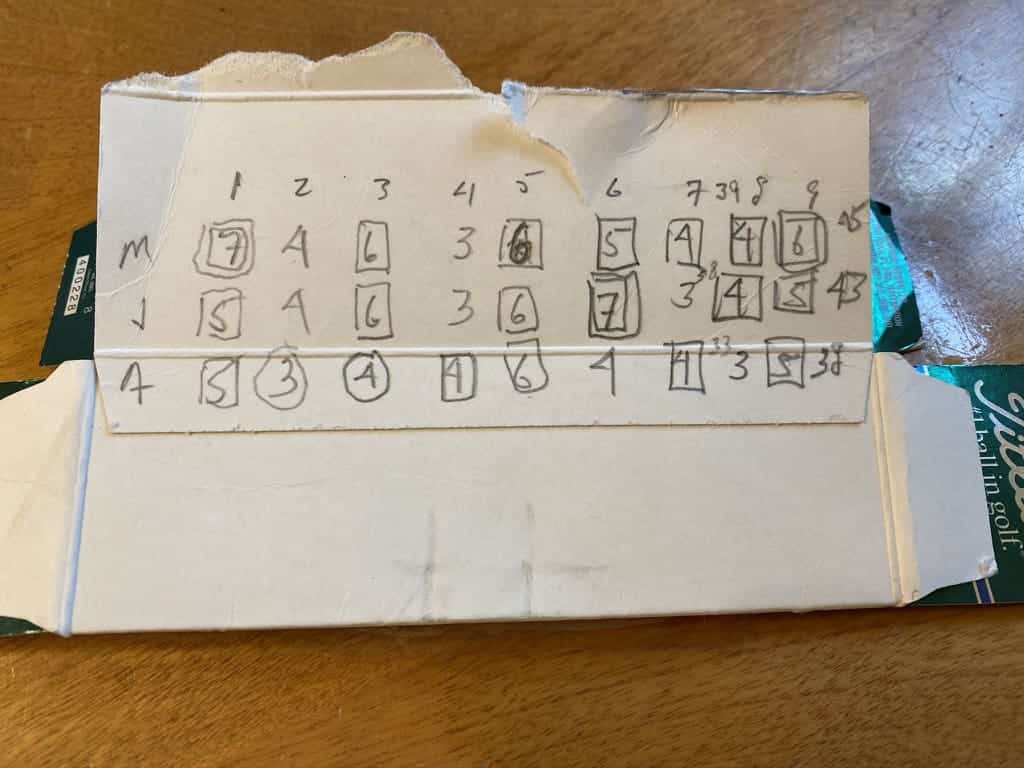Swinging away
Good news! Two weeks ago, I shot a 45 on the back 9 at Rockledge Country Club, producing my best round ever.
Naturally, it was the one time when we failed to snag a scorecard before the round, so this epic achievement is recorded on the inside of a box of golf balls.

A 45 is officially bogie golf: An average of one stroke more than par for every hole, and it includes a bogie on the 14th hole (#5 on the scorecard), which has been my nemesis for years.
Not great by any standard, but great by my pathetic standards.
I’ve been playing much better over the course of the last two months thanks primarily to my friend, Jeff, who watched me make a dozen small adjustments prior to every single swing all summer before finally saying, “Do me a favor and stop thinking. Just swing away.”
So I did. Standing in the middle of a fairway at Tunxis Country Club, I stopped thinking for the first time in a long time and swung. Muscle memory took over, and suddenly, I could hit the ball again. It leapt from the club. Soared through the air. Better than ever before.
This isn’t to say that I’m not trying to improve. I continue to apply the skills and techniques learned in the lessons I’ve taken, but now I practice and adjust on the driving range. When I’m playing the game, I just swing away. As a result, my scores have been lower, and my happiness on the golf course has been much greater.
No more overthinking. Just swing away. Hit the damn ball.
Credit also goes to my friend, Scott, who made a tiny but critical adjustment to my putting early this year. He, too, essentially told me to swing away. Stop lifting your putter off the ground. Stop trying to line up club and ball perfectly. Just swing away.
This has transformed me from a good putter to an excellent putter almost overnight.
These two friends have made golf a more joyous, more relaxed game for me. I play without the constant, repetitive, almost obsessive thought that once consumed my game. I suspect there’s a powerful metaphor about the dangers of overthinking and the importance of of trusting instinct lurking somewhere in this summer of golf.
A lesson on listening, too. Trust, perhaps. Even friendship.
The day after shooting this historic score, I returned to the driving range bright and early to continue my practice. On my fifth swing, a gentle wedge, I herniated a disc in my back, sending me to the ground in mind-numbing pain. It took me nearly an hour to get home, and I spent the next two days in agony, worried that I had just ruined the rest of my summer.
I have heard that back pain is the worst. As a child, I watched my mother’s multiple back surgeries ravage her life. It was a frightening time for me. I was terrified that my life had suddenly changed forever with the simple swing of a golf club.
But two weeks and two doctors appointments later, which have included a slew of steroids, muscle relaxers, and Tylenol, plus a regime of physical therapy, and I am nearly back to 100%. Five days after hurting my back, I returned to the golf course and played 18 holes. Gingerly at first, but with greater confidence with each swing.
I shot a 103. Not great. Not bogie golf. But golf. Thank goodness, I was playing golf again.
This morning, I return to physical therapy. My therapist is the practice’s golf specialist. I get to tell him that except for the first hour of every morning, my back has felt almost perfect. I’ve returned to the golf course. Returned to my bike. Returned to swimming.
Once again, I’m swinging away.
More than one friend pointed out that this experience was very “on brand” for me:
Shoot the round of your life. Destroy your back the next day.
This is also true. My life tends to be filled with lots of highs and lows. Not much middle ground.
But when I’m playing golf with my friends, regardless of my swing or my score, there’s no question that I’m riding one of those highs, happy as can be.
